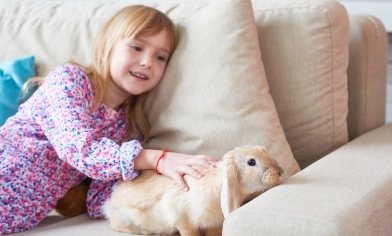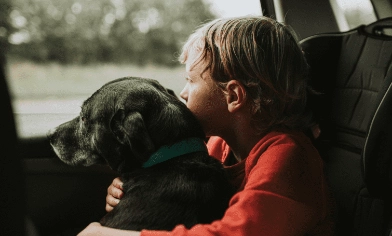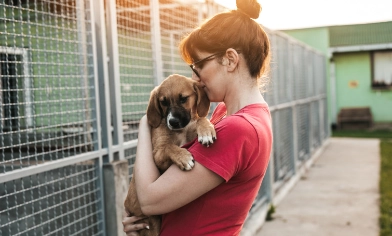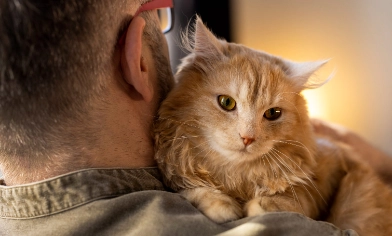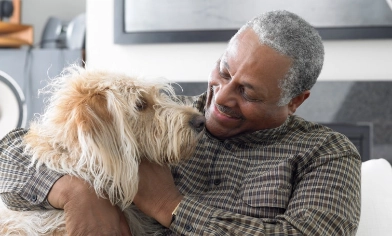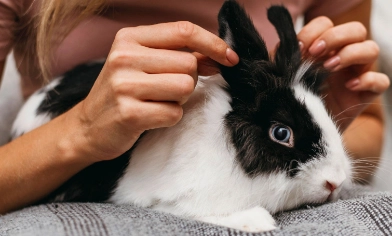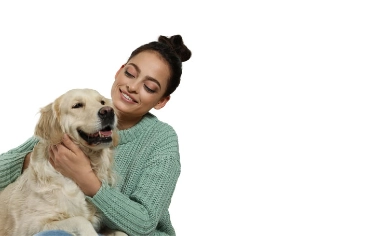What’s safe and what’s not?
Many dog owners have occasionally shared a bite of their favourite foods with their canine companions, whether it’s a piece of toast or a bit of dinner. And almost every dog has managed to get their paws on tasty treats when their human wasn’t looking. But not all food and drink are safe for our furry friends. While some are nutritious and beneficial, others can be toxic, harmful or simply unhealthy.
So, what should you be feeding your dog? We spoke to Anna Foreman, a practicing veterinary surgeon, to learn more about which foods are safe for your dog to eat, and which foods they need to avoid. She says, “ Humans and dogs differ in how they process food, and it isn’t just about quantity. Animals and humans have different metabolisms, meaning they don’t process certain chemicals in the same way. Consuming toxic foods can lead to gastrointestinal issues, neurological symptoms, such as seizures, kidney failure and, in the most severe cases, death.”
With that in mind, we explore the benefits and potential dangers of different types of foods. That way, you can make more informed choices about your dog’s diet and help them lead a happier, more active and fulfilling life.
Foods you should never feed your dog
- Chocolate contains theobromine, which is toxic for dogs. Small amounts of chocolate can cause vomiting and diarrhoea, but higher doses could lead to seizures and can occasionally be fatal
- Grapes and raisins can cause kidney failure in dogs, whether eaten raw or baked in other foods. Symptoms include vomiting, diarrhoea, lethargy and a loss of appetite. Eating grapes and raisins can be fatal in severe cases. They’re also a potential choking hazard
- Onions, garlic and chives can lead to red blood cell damage in dogs, causing anaemia. Common symptoms include vomiting, diarrhoea, abdominal pain and lethargy. In severe cases, it could even be fatal
- Whole fruits with stones or pits can be a choking hazard for dogs and could cause an intestinal blockage if swallowed
- Macadamia nuts are highly toxic for dogs. They can cause muscle weakness, depression, vomiting, lameness, tremors and hyperthermia, with symptoms appearing within 12 hours of ingestion
- Alcohol is toxic to dogs. It can cause vomiting, diarrhoea, weakness and tremors, and it can be fatal in severe cases
- Sugar-free products containing xylitol can be very dangerous to dogs. Also known as E967, this sugar substitute is commonly found in items like chewing gum and peanut butter. In dogs, xylitol triggers a rapid release of insulin, which can cause a severe drop in blood sugar levels. This can result in seizures, liver failure and, in some cases, it can even be fatal
- Corn on the cob isn’t toxic for dogs, but the cob can cause a choking hazard. If it causes a blockage, your dog might need surgery to remove it
- Cooked bones can splinter and cause serious injuries to a dog’s digestive tract, including choking, intestinal blockages or tears in the stomach or intestine
- Avocados contain persin, a fungicidal toxin. It’s mainly found in the leaves and bark of the avocado plant, as well as the pit and skin on the fruit. But there's also concentrated amounts in the flesh. Although there’s some debate about how harmful avocados are to dogs, it’s best to be cautious. Avoid giving your dog any avocado, especially as the pit poses a choking hazard
Please note, this list isn’t exhaustive. If you don't see a specific food or drink listed here, always check if it's safe for your dog by searching reputable sources online. You can also ask your vet for advice.
What if my dog has eaten any of these foods?
“If your dog eats something harmful, or even if you suspect they might have, contact your vet immediately for advice,” says Anna. “Be sure to tell them your dog’s weight, what they’ve eaten, how much and when. Having the packaging or ingredients list on hand can be helpful too. Avoid trying to make your dog vomit at home, as this can lead to more complications.”
You should also remove any remaining harmful food from their reach. Don’t wait for symptoms to appear, as this could make your dog seriously ill. Seek help as soon as you can.
Safe foods for dogs
- Lean meats such as chicken and turkey are excellent sources of protein for dogs. Protein helps maintain healthy bones and supports overall growth. They also provide vital amino acids and nutrients like B vitamins and iron
- White fish is also a great source of protein, helping to support muscle development and energy. It’s also rich in omega-3 fatty acids, which promote healthy skin, a shiny coat and reduce inflammation
- Carrots are rich in beta-carotene, which converts to vitamin A in the body. This helps support good vision and immune health. They’re also a good source of fibre and low in calories, making them a healthy snack option
- Cucumbers are low in calories and high in water content, making them an excellent hydrating food for dogs. They also provide vitamins K, C and several B vitamins, plus minerals like potassium and magnesium which help support overall health
- Watermelon is another hydrating and low-calorie fruit for dogs. It provides vitamins A, B6 and C, which support immune function and overall health
We haven’t listed every safe food here, so it’s important to do your own research. And while these foods are generally safe, they still should be given in moderation.
Occasional treats
- Peanut butter without xylitol is a popular dog treat. It’s tasty and packed with healthy fats, protein and vitamins E and B, making it a great option for training or hiding medication. But as peanut butter is high in calories, it should only be given in moderation
- Pumpkin is high in fibre and can help regulate a dog’s digestive system. It’s low in calories and rich in vitamins A and C, which help support immune health and vision
- Pasta and rice are easily digestible carbohydrates that can be a good source of energy for dogs. Always serve them plain, without any sauces, spices or seasonings, as these can be harmful to dogs. Offer them in moderation because too many carbohydrates can cause weight gain
- Dairy products, like cheese and plain yoghurt, are high in calcium and protein, which supports strong bones and muscles in dogs. But keep in mind that many dogs are lactose intolerant, so it’s important to introduce dairy in small amounts and watch for any signs of discomfort. Some dogs tolerate lactose better than others, so always be mindful of their individual reactions
What fruits can dogs eat?
Dogs can eat fresh fruits, like raspberries, strawberries, blueberries and bananas. They're low in fat and rich in vitamins and fibre that support healthy digestion. Since fruit can be high in sugar, it’s best to offer them to your dog in small amounts occasionally.
The foods we’ve listed here are safe as occasional treats, but you should be careful how often and how much you give to your dog.
As Anna explains, “Many foods can be given to dogs in moderation, but offering them too frequently can cause issues. This can include vomiting, diarrhoea and potentially pancreatitis. Some foods are high in fat and carbohydrates, which can lead to weight gain or even obesity if given regularly, even in small quantities.”
How many treats should I give my dog each day?
Dogs love getting their paws on a tasty treat, but it’s important not to give your pet too many. Treats should be less than 10% of a dog’s daily caloric intake. Most of their calories should come from a balanced diet.
Why a balanced diet matters
Although it's fine to give your dog safe human foods and the occasional treat, feeding them a balanced diet is crucial for keeping them happy and healthy.
“Just like us, dogs need to eat a balanced diet to stay healthy,” Anna explains. “They need the right amount of protein, carbohydrates, fats, vitamins and minerals to help prevent malnutrition. Unfortunately, malnutrition can lead to other health problems such as diabetes, arthritis and could put your pet at risk if they ever need to go under anaesthetic.”
The right food can also help give your pet the nutrients they need to support their immune system, keep their coat shiny and their muscles strong. It also helps their organs work properly. A well-nourished dog is also likely to be more energetic, well-behaved and generally happier.
A balanced diet also helps prevent obesity, which is linked to other health issues like diabetes, heart disease and joint problems. Anna points out: “As obesity becomes increasingly common in dogs, it’s important to measure out food quantities based on recommendations. Then, you need to adjust this amount according to your dog’s activity level and whether they need to lose, gain or maintain their weight. A simple way to calculate your dog’s resting caloric need is to multiply their ideal body weight by 30 and then add 70 (weight in kg x 30 + 70).”
Can a dog’s diet affect your pet insurance?
“Many health conditions are caused, impacted or accelerated by malnutrition, which can increase the likelihood of a claim and the onset of health issues,” Anna explains. “Obese animals are at a higher risk of complications during anesthesia and are more likely to develop arthritis. Dogs lacking proper nutrition early in line are vulnerable to metabolic diseases. There’s also evidence linking grain-free diets to heart conditions in dogs. Additionally, a dog’s diet significantly affects their dental, skin and intestinal health.”
She adds: “Some pet insurance companies may ask a vet about a dog’s body condition score when assessing claims for certain conditions, particularly orthopedic issues. Obese dogs might have their treatment claims denied due to the strong connection between obesity and conditions like joint disease.”
Key takeaways
- A balanced diet is essential for keeping your dog happy and healthy. This means knowing which foods are safe and which are not, as some human foods can be very dangerous for dogs
- Never feed your dog foods like chocolate, grapes and raisins, onions, garlic and chives and sugar-free products containing xylitol. These are toxic to dogs and could cause serious health problems. You should also avoid giving your dog foods like corn on the cob or fruits with stones or pits, as they’re a potential choking hazard. If you’re unsure whether a food is safe, it’s best to avoid it. If your dog eats an unsafe food, always contact your vet
- Foods like lean meats, white fish, carrots, cucumber and watermelon are safe for your dog to eat and offer nutritional benefits. Occasional snacks like peanut butter (without xylitol), pumpkin and fresh fruits are also fine but remember, treats should be less than 10% of your dog’s daily caloric intake
